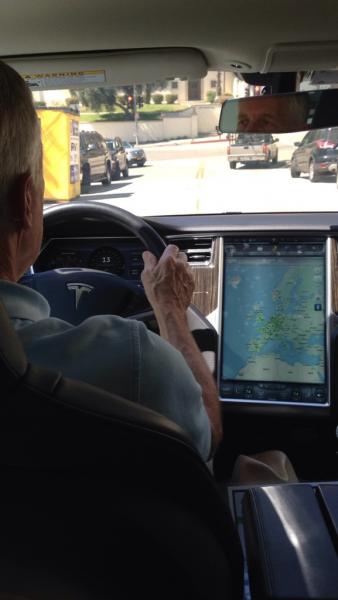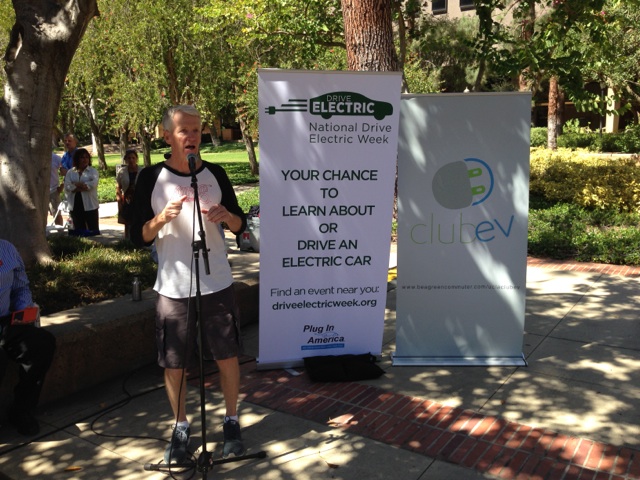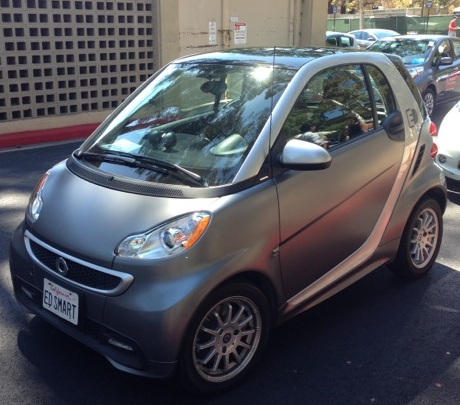National Drive Electric Week Shifts Into Gear

“The point is to get people into cars,” said Zan Dubin-Scott, founder of National Drive Electric week. “We know that nothing so much converts a gas driver to an electric driver as actually getting in the car and feeling that thrill of instant torque and never going to the gas station again, plus knowing that you’re not contributing to climate change nearly as much as if you were driving a gasoline car.”
Founded in 2011, National Drive Electric week is an initiative to increase awareness of all-electric and plug-in hybrid-electric vehicles.
There are over 150 events hosted nationwide, and each event is fueled by community involvement and volunteers. Local community members bring their own electric vehicles to the event and allow attendees to check out the technology, ride along in a car or even take one out for a test drive.
SEE ALSO: Downtown L.A. Architecture Goes Green
Over ten different models of electric vehicles were showcased on the UCLA campus, with the Tesla Model S, Nissan Leaf, Chevrolet Volt and Volkswagen e-Golf being the most popular. Two brands of electric motorcycles were also on display.
“We have the Tesla Model S here today, which everyone wants to drive,” said Dubin-Scott. “It goes from 0-60 in four seconds, they’re quiet, you never have to go to the gas station and it charges while you’re asleep at home.”
In addition to the electric vehicles on exhibit, there were promotional booths and industry representatives showcasing new products and information. With a hefty price tag attached to many electric vehicles, government rebates and incentives were a large focus.
“There is a California cash rebate that is $2,500 for every pure electric car and there is also a federal tax credit up to $7,500 for certain models,” said Michael Buttery, outreach assistant for the California Center for Sustainable Energy. “Besides that, there are other local incentives that depend on utilities or respective air districts.”

Most of the organizing for National Drive Electric week stems from Plug In America, the Sierra Club and the Electric Auto Association, along with other local partners. These groups have made efforts to advocate in front of state and national representatives and pressure the auto industry to make electric vehicles more accessible.
“Besides exposing people to electric cars, we’re here to really help the industry, because we want to see widespread electric vehicle adoption,” said Dubin-Scott. “We just hit a tremendous landmark, which was last week we reached the first 250,000 plug in electric vehicles sold in the U.S.”
For long-time supporters, this has been almost two decades in the making. Paul Scott, an electric vehicle and renewable energy activist, has been driving an electric vehicle since 2002.
“We continue to push because we need to transition away from gas and oil and onto renewable electricity as transportation energy for a variety of reasons having to do with the environment, health, the economy and with national security,” said Scott.

“The perk of driving electric vehicles is the equivalent of $0.75 per gallon of gasoline,” said Dubin-Scott. “There are no oil changes, transmission fixes or smog checks, so it’s a tremendous benefit.”
If range or battery life is a concern, Nissan offers a battery replacement plan that is cost effective and cheaper than previous alternatives. The Nissan Leaf is also capable of driving 100 miles per fully charged battery.
“You drive the car 8-10 years, the battery fades, you don’t have enough range anymore, so you get a new battery put in for $6,000, and you virtually get a brand new car,” said Scott. “The rest of the car still runs like brand new because these cars are meticulous—you press down and you get a perfect linear curve, the more you press, the faster you go. And it’s like that for the life of the car.”
The remaining 2014 National Drive Electric Week events can be found here.
Reach Editor-at-Large Michael Nystrom here. Follow him on Twitter here.



